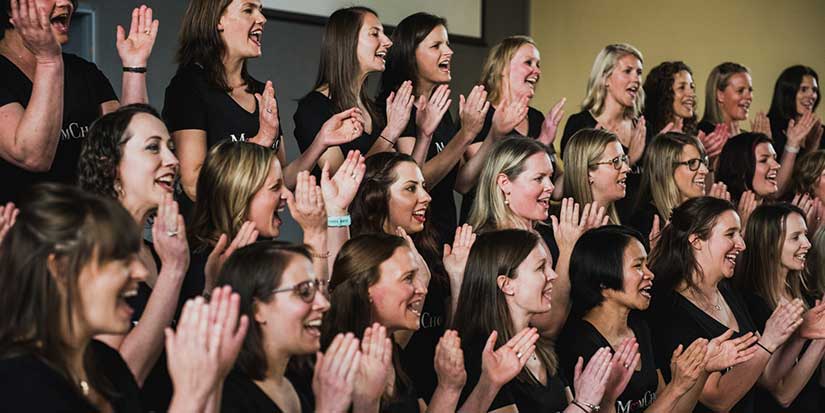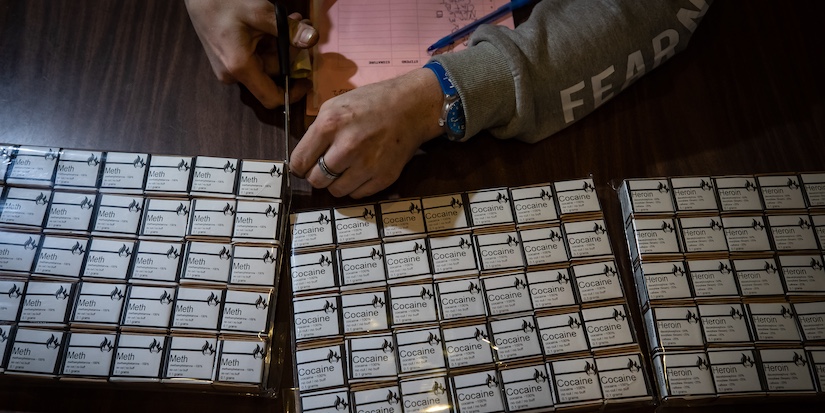Arts & Culture
Concert brings awareness to postpartum challenges

By Hannah Scott, Local Journalism Initiative reporter
Published 10:22 PST, Thu March 5, 2020
Last Updated: 2:13 PDT, Wed May 12, 2021
—
Motherhood can often be a difficult journey, particularly when new moms feel alone and isolated.
“It Takes a Village” was last weekend’s community concert that aimed to connect mothers through song and performance.
Two groups performed: MomChoir, an all-mom vocal ensemble, and six-piece female a cappella group Sweet Scarlet—who have 15 children between them. The recent event followed the groups’ May 2019 concert of the same name.
MomChoir director and Sweet Scarlet member Katy Cadman came up with the idea for the first “It Takes a Village” concert.
“I was reflecting on how music was such an important part of staying connected and feeling supported during the tough times of motherhood,” says Cadman. “It felt like the right thing to do to put on a concert about motherhood for an amazing cause—the Pacific Post Partum Support Society,” she says.
The members of Sweet Scarlet have been singing together since before any of them had children.
“All of the members are on their own journey of parenthood, but they are not alone. Just knowing that we are all doing it makes us feel connected,” says Cadman.
After witnessing the support Sweet Scarlet offered to one member who had postpartum depression, Cadman wanted to create a safe space for mothers on a larger scale—so she started MomChoir.
The second “It Takes a Village” concert partnered with the Pacific Post Partum Support Society again, along with Vancouver Coastal Health, City Centre Community Association and Richmond Public Health.
“At City Centre, we are very interested in connecting with the community and providing support for people within the community,” says Venecia Williams, City Centre board member and spokesperson for the event. “This is an opportunity to support parents that go through these issues, but also for the community to learn more about postpartum (challenges). We can create empathy among people in our community who may not experience this themselves, but they may come into contact with people who are experiencing these issues.”
The importance of community connection is echoed by Pacific Post Partum Support Society director Sheila Duffy. The organization offers community support all over the Lower Mainland and has an emotional support and health line that takes up to 5,000 calls every year.
Their Richmond support group—in partnership with Richmond Public Health—meets once a week and supports mothers from pregnancy up to three years postpartum.
Concerts like this, Duffy explains, help to reach moms in the community who may be struggling, raising awareness and breaking the stigma around postpartum issues.
The concert was attended by women of all ages, some men, and a number of children. In a pre-concert photo slideshow, singers held up messages of encouragement written on whiteboards.
“You will find yourself again—different but better.”
“The days are long but the years are short.”
“It’s okay to ask for help.”
Short introductions and memories shared between songs strengthened these messages. During longer stories, members opened up about their experiences pre- and postpartum.
The old adage says that it takes a village to raise a child. “It also takes a village to raise a mother,” said Sweet Scarlet member Eran Sudds, praising the support she received from her fellow singers.
One member of MomChoir felt the same way when going through prepartum depression.
“I recognized that a quiet village had been growing around me,” she said. “Please, ask for help. Prepartum depression does not define your journey into motherhood.”
While the quality of the singing was excellent, and the song choices meaningful and touching, messages like these were at the heart of the concert. The members of MomChoir and Sweet Scarlet crafted an evening that was a powerful display of the strength and sisterhood that comes with being a mother.
“Everyone needs to have caring people in their lives that they can depend on to listen and share the load,” says Cadman. “Sometimes just knowing that others are feeling the same way can make you feel less alone.”






























